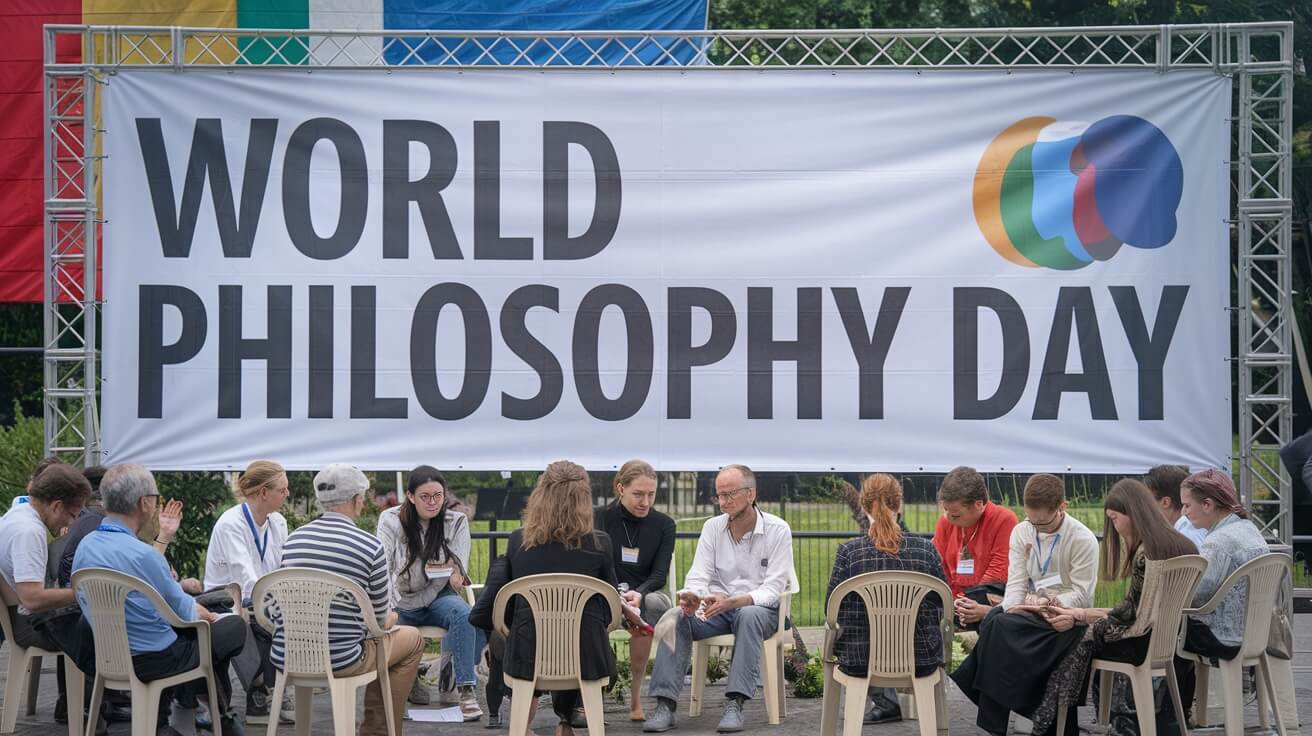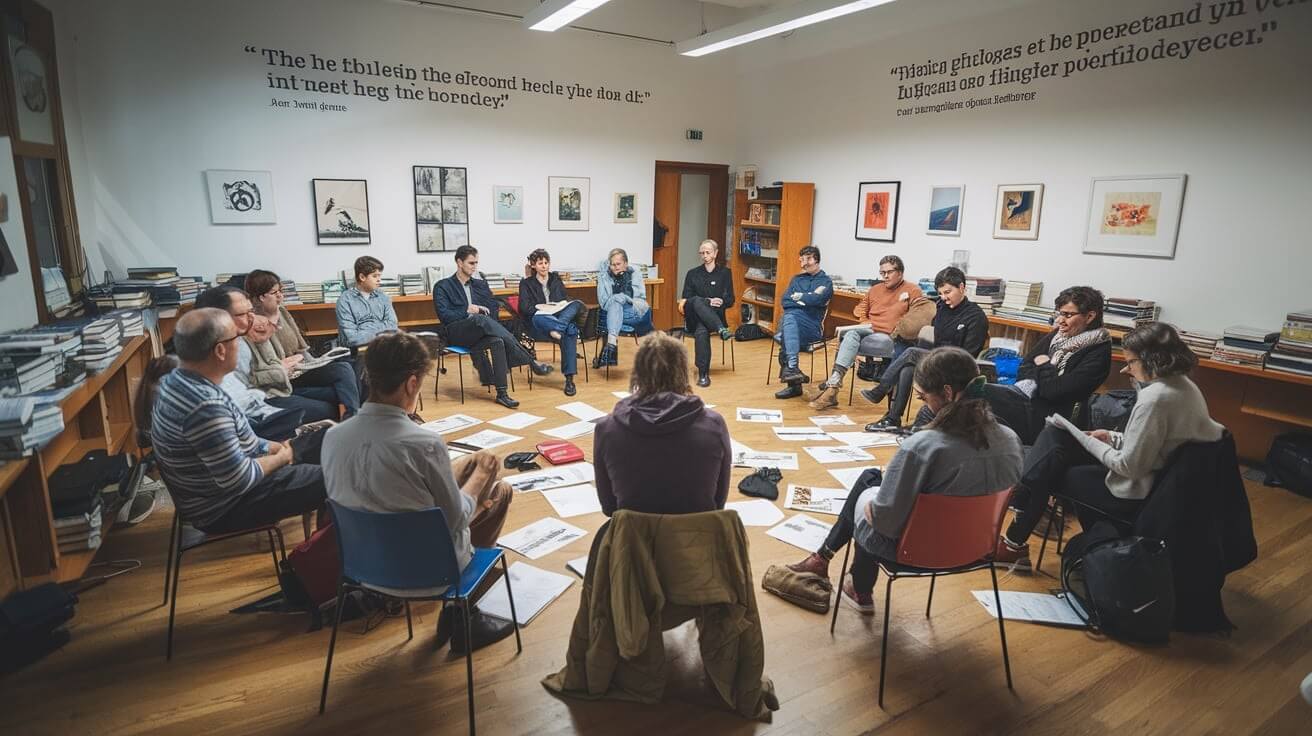
World Philosophy Day: Exploring Its History, Importance, and Modern Relevance
Have you ever wondered, "What's the meaning of life?" or "Why do we behave the way we do?" These questions lie at the heart of philosophy, a discipline dedicated to exploring the fundamental truths about existence, ethics, and the human condition.
Philosophy isn't just for academics—it's something we all use when making decisions, forming opinions, or navigating challenges.
Every year, World Philosophy Day, celebrated on the third Thursday of November, reminds us of the importance of philosophical reflection in fostering dialogue, understanding, and progress. Established by UNESCO in 2002, this global event encourages people from all walks of life to engage with philosophical ideas, share perspectives, and challenge their thinking.
This article will explore World Philosophy Day's history, significance, and modern relevance. You'll discover how philosophy shapes our society, why it's essential today, and practical ways to incorporate it into your daily life.
What is World Philosophy Day?
World Philosophy Day was first celebrated in 2002. UNESCO initiated it to underline philosophy's role in promoting critical thinking and fostering peace. Philosophy challenges us to question our assumptions, debate ethical dilemmas, and appreciate diverse perspectives. By dedicating a day to this discipline, UNESCO aimed to make philosophy accessible to everyone—not just scholars.
Since its inception, World Philosophy Day has grown into a global celebration, observed in over 100 countries through workshops, lectures, and cultural events. The day provides a platform for people to reflect on pressing issues like climate change, technological ethics, and social justice through a philosophical lens.
UNESCO's Role in Promoting Philosophy
UNESCO's mission with World Philosophy Day goes beyond celebration—it's about education. The organization emphasizes philosophy as a practical tool for addressing global challenges and fostering cultural understanding. Through initiatives like public debates and academic conferences, UNESCO helps ensure that philosophy remains a relevant and accessible discipline.
The Importance of Philosophy in Society
Philosophy has earned the title "mother of all sciences" because it forms the foundation of critical thinking, logical reasoning, and analytical inquiry. Philosophy is about asking questions that challenge assumptions, seeking clarity, and evaluating arguments precisely. By engaging with philosophical ideas and avoiding snap judgments or emotional biases that often cloud decision-making, individuals learn to approach problems methodically.
One of the most enduring contributions of philosophy to critical thinking is the Socratic method, developed by the Greek philosopher Socrates. This technique involves asking probing questions to stimulate reflection and uncover underlying beliefs.
For instance, instead of accepting a statement at face value, the Socratic method encourages asking why and how to reach more profound truths. This approach has become a cornerstone of education, leadership training, and even legal practices, as it cultivates clarity and fosters intellectual humility.
Philosophy also teaches us to recognize and challenge cognitive biases, such as confirmation or groupthink, which can hinder rational decision-making. By applying philosophical tools, individuals can dissect arguments, assess evidence, and consider multiple perspectives before arriving at conclusions.
The practical value of these skills is undeniable. As per the 2021 survey, 72% of employers ranked critical thinking as one of the most desirable skills in the workplace, underscoring its importance in problem-solving, collaboration, and innovation.
A philosophical foundation enhances individual decision-making and equips people to navigate complex, high-stakes environments where clear reasoning is crucial. Whether you're analyzing data, resolving conflicts, or making policy decisions, critical thinking rooted in philosophical inquiry remains an invaluable asset in modern life.
The Role of Philosophy in Governance, Ethics, and Education
Philosophy profoundly shapes governance, ethics, and education, influencing the structures and principles underpinning a fair and progressive society. These interconnected domains benefit immensely from philosophical inquiry, providing the intellectual tools necessary for thoughtful decision-making, moral reasoning, and effective teaching.
Governance
Philosophical principles are the backbone of creating equitable laws and policies in governance. Concepts like justice, fairness, and equality—rooted in philosophical traditions—guide policymakers in addressing societal challenges. For instance, John Rawls' theory of justice, emphasizing fairness and the "veil of ignorance," has significantly impacted modern discussions about wealth distribution, social welfare, and governance systems. Philosophical ideas ensure that laws are efficient and morally grounded, fostering public trust and inclusivity in leadership.
Ethics
Philosophy is essential in navigating ethical dilemmas in complex, modern societies. Frameworks like utilitarianism, which seeks the greatest good for the most significant number, and deontology, which focuses on duty and moral rules, offer guidance in resolving pressing issues. For example:
-
Philosophical debates around the ethical use of personal data influence regulations like the GDPR.
-
Ethical philosophy frames discussions about our responsibility to future generations, emphasizing sustainability over short-term gains.
-
Philosophical reasoning helps people and organizations carefully assess the outcomes of their decisions, guiding them to make choices that reflect and support the values of society as a whole.
Education
Philosophy deeply enriches education, as it fosters critical thinking and intellectual curiosity. Schools that integrate philosophical inquiry into their curriculum report measurable improvements in students' problem-solving skills, creativity, and ability to articulate ideas.
Programs like Philosophy for Children (P4C) encourage students to ask meaningful questions, challenge assumptions, and engage in collaborative dialogue. This benefits academic performance and prepares students to navigate a world where independent thinking and ethical reasoning are increasingly vital.
How the World Celebrates World Philosophy Day
World Philosophy Day is a global celebration that brings people together to explore the profound questions and ideas that shape our lives. Each year, it encourages various events and activities, offering individuals and communities the chance to connect with philosophical ideas meaningfully.

Global Events and Activities
World Philosophy Day is observed through diverse global events, showcasing philosophy's relevance in addressing contemporary challenges. These include:
1. Public Discussions:
Open discussions allow participants to explore and share perspectives on essential social issues, such as climate change, social justice, and the ethical concerns surrounding artificial intelligence. These discussions encourage the exchange of diverse perspectives, fostering mutual understanding and critical dialogue.
2. Educational Workshops:
Schools, universities, and cultural institutions host workshops and seminars on themes like ethics in technology, artistic philosophy, and the philosophy of education. For example, a workshop might explore questions like "What ethical responsibilities do we have toward AI?" or "How does philosophy shape cultural identities?"
3. Artistic Expressions:
Philosophy is also explored through creative mediums such as art, music, and film. Exhibitions might feature works inspired by existentialism, while theatrical performances bring philosophical debates to life on stage.
In 2022, UNESCO organized a global dialogue on philosophy and artificial intelligence, focusing on the ethical concerns of emerging technologies in the digital age. Such events highlight philosophy's enduring relevance in addressing modern dilemmas.
How You Can Celebrate
How can you join the celebration? Here are a few ideas to make World Philosophy Day personal and engaging:
1. Read a Classic:
Dive into a timeless philosophical work like The Republic by Plato or Meditations by Marcus Aurelius. These texts invite you to reflect on fundamental questions about justice, morality, and personal growth.
2. Host a Debate:
Gather friends, family, or colleagues to discuss a thought-provoking philosophical question, such as "What does it mean to live a good life?" Debates like these spark lively discussions and encourage critical thinking.
3. Reflect Personally:
Take time for introspection by journaling your thoughts on a question you've been pondering. Whether it's "What truly matters to me?" or "How can I contribute to society?", such reflections help you connect with the core themes of philosophy.
Participating in these activities, you honor the spirit of World Philosophy Day and engage in a meaningful exploration of the ideas that shape our world and personal lives. Whether through public events or quiet moments of reflection, the day offers something for everyone, inviting us all to celebrate the power of thought and dialogue.
Key Philosophical Questions Explored on This Day
World Philosophy Day invites us to grapple with some of life's most enduring questions:
-
What is the nature of happiness?
-
How do we define justice?
-
What responsibilities do we have toward future generations?
Insights from Famous Philosophers
Philosophers throughout history have provided diverse answers to these questions.
-
Socrates Encouraged self-examination with his famous saying, "An unexamined life is not worth living."
-
Immanuel Kant focused on moral imperatives, emphasizing that we should act according to principles we wish everyone would follow.
-
Simone de Beauvoir explored freedom and responsibility, particularly in feminism and existentialism.
Philosophy's Relevance in the Modern World
Philosophy equips us with tools to navigate complex issues, such as:
-
Climate Change: Ethical discussions about resource distribution and environmental justice.
-
Technology: Balancing innovation with ethical considerations like data privacy.
-
Social Justice: Promoting equity through philosophical frameworks like egalitarianism.
Examples of Philosophy's Influence in Everyday Life
Philosophy isn't confined to academia—it shapes our daily decisions. For instance:
-
Public Policy: Governments often use philosophical principles to craft legislation.
-
Personal Choices: Philosophical thinking helps individuals weigh pros and cons when making decisions.
Practical Ways to Incorporate Philosophy into Daily Life
1. How to Start Thinking Philosophically
You don't need a degree to engage with philosophy. Here's how to begin:
-
Ask Big Questions: Reflect on questions like, What truly matters in life?
-
Read Thought-Provoking Content: Explore blogs, articles, or books that challenge your perspective.
-
Engage in Discussions: Talk with friends or family about philosophical ideas to broaden your understanding.
2. Benefits of Philosophical Reflection
-
Improved Decision-Making: By analyzing situations critically, you're less likely to act impulsively.
-
Emotional Growth: Philosophy fosters resilience by encouraging acceptance and understanding of life's uncertainties.
-
Stronger Relationships: Ethical reflection helps us navigate interpersonal conflicts with empathy.
Scholarly Insights and Reflections
-
Martha Nussbaum highlights the importance of philosophy in fostering compassion and justice.
-
Cornel West advocates for philosophy's role in addressing societal inequalities.
Unlike faded trends, philosophy evolves with society, offering timeless insights while adapting to new challenges.
FAQs About World Philosophy Day
What is World Philosophy Day?
A global event established by UNESCO to celebrate the value of philosophy in promoting dialogue and understanding.
Why is philosophy critical?
Philosophy shapes critical thinking, ethical decision-making, and cultural dialogue.
How can I celebrate World Philosophy Day?
Participate in a debate, read a philosophical text, or reflect on a meaningful question.
Which countries observe World Philosophy Day?
Over 100 nations celebrate this day, including France, India, and Kenya.
Can philosophy help in daily life?
Absolutely! Philosophy provides tools for better decision-making, empathy, and resilience.
Conclusion
World Philosophy Day is more than just an observance—it's an opportunity to reflect on the power of ideas to shape our world. By engaging with philosophical thinking, you can gain clarity, foster understanding, and contribute to a more thoughtful society.
So why not start today? Pick a question, start a discussion, or dive into a book. Philosophy isn't just for one day—it's for a lifetime.
International Days and Weeks

